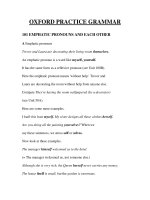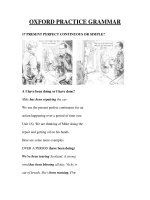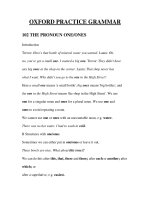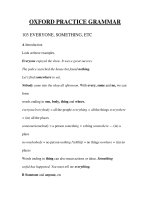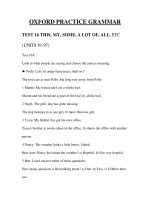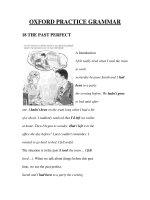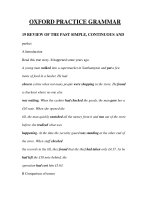OXFORD PRACTICE GRAMMAR 110
Bạn đang xem bản rút gọn của tài liệu. Xem và tải ngay bản đầy đủ của tài liệu tại đây (342.14 KB, 11 trang )
OXFORD PRACTICE GRAMMAR
110 COMPARATIVE AND SUPERLATIVE FORMS
We form the comparative and superlative of short adjectives (e.g. cheap)
and long adjectives (e.g.
expensive) in different ways.
COMPARATIVE SUPERLATIVE
Short word, e.g. cheap: cheaper (the) cheapest
Long word, e.g. expensive: more expensive (the) most expensive
For less and least, see Unit 112A.
There are some less expensive ones here, look.
B Short and long adjectives
One-syllable adjectives (e.g. small, nice) usually have the er, est ending.
Your hi-fi is smaller. Emma needs a bigger computer.
This is the nicest colour. This room is the warmest.
But we use more, most before words ending in ed.
Everyone was pleased at the results, but Vicky was the most pleased.
We also use more, most with three-syllable adjectives (e.g. ex-cit-ing) and
with longer ones.
The film was more exciting than the book. This dress is more elegant. We
did the most
interesting project. This machine is the most reliable.
Some two-syllable adjectives have er, est, and some have more, most. Look
at this information.
TWO-SYLLABLE ADJECTIVES
1 Words ending in a consonant + y have er, est, e.g. happy * happier,
happiest.
Examples are: busy, dirty, easy, funny, happy, heavy, lovely, lucky, pretty,
silly, tidy
2 Some words have er, est OR more, most, e.g. narrow ► narrower,
narrowest OR more narrow, most namt
Examples are: clever, common, cruel, gentle, narrow, pleasant, polite, quiet,
simple, stupid, tired
3 The following words have more, most, e.g. useful * more useful, most
useful.
a Words ending in ful or less, e.g. careful, helpful, useful; hopeless
b Words ending in ing or ed, e.g. boring, willing; annoyed, surprised
c Many others, e.g. afraid, certain, correct, eager, exact, famous, foolish,
frequent, modern, nervous, normal,
recent
110 Comparative and superlative forms
C Spelling
There are some special spelling rules for the er and est endings.
1 e -> er, est, e.g. nice ~> nicer, nicest, large ~> larger, largest.
Also brave, fine, safe, etc
2 y-> ier, iest after a consonant, e.g. happy -> happier, happiest.
Also lovely, lucky, pretty, etc
3 Words ending in a single vowel letter + single consonant letter -> double
the consonant
e.g. hot -> hotter, hottest, big -> bigger, biggest.
Also fit, sad, thin, wet, etc (but w does not change, e.g. new -> newer)
For more details, see page 371.
D The comparison of adverbs
Some adverbs have the same form as an adjective, e.g. early, fast, hard,
high, late, long, near.
They form the comparative and superlative with er, est.
Can't you run faster than that? Andrew works the hardest.
Note also the spelling of earlier and earliest.
Many adverbs are an adjective + ly, e.g. carefully, easily, nicely, slowly.
They form the comparative and superlative with more, most.
We could do this more easily with a computer.
Of all the players it was Matthew who planned his tactics the most carefully.
In informal English we use cheaper, cheapest, louder, loudest, quicker,
quickest and slower, slowest
rather than more cheaply, the most loudly, etc. Melanie reacted the
quickest. You should drive
slower in fog.
Note the forms sooner, soonest and more often, most often.
Try to get home sooner. I must exercise more often.
E Irregular forms
Good, well, bad, badly and far have irregular forms.
ADJECTIVE/ADVERB COMPARATIVE SUPERLATIVE
good/well better best
bad/badly worse worst
far farther/further farthest/furthest
You've got the best handwriting. How much further are we going?
We can use elder, eldest + noun instead of older, oldest, but only for people
in the same family.
My elder/older sister got married last year.
F Comparing quantities
We use more, most and their opposites less and least to compare quantities.
I haven't got many
books. You've got more than I have. The Hotel Bristol has the most rooms.
Trevor spends less on
clothes than Laura does. Emma made the least mistakes.
110 EXERCISES
1 The comparison of adjectives (A-B)
Complete the sentences. Use these adjectives: beautiful, expensive, high,
interesting, tall

